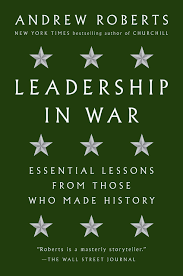History, Leadership and War
Andrew Roberts is a successful and prolific British historian. Almost as much a journalist as a scholar at this latter stage in his career, Roberts is probably best known for his biography of Winston Churchill. He writes with confidence, vigor, and a conservative perspective.

In his 2019 work, Leadership in War: Essential Lessons From Those Who Made History, Roberts presents the reader with nine short biographic sketches of well-known leaders, focusing on their traits in conflict. Emphasizing that leadership is value-neutral – it can be for the good or the bad – Roberts wrote the book as an outgrowth of a series of lectures he had given at the New York Historical Society. That helps to explain the particular kind of leaders looked at here; stated simply, they are of interest to the author. Leadership in War offers very few historical surprises in its examination of Bonaparte, Nelson, Churchill, Hitler, Stalin, Marshall, de Gaulle, Eisenhower and Thatcher. If you have read a short biography of any of these figures, you would be familiar with the outlines of their lives and the leadership in war.
Roberts brings something different to the task: an appreciation and understanding of the profound sense of self-belief exhibited by these figures. Coupled with that self-reliance, each of the leaders yoked their efforts to a larger cause. Each thought that their people, their team, their nation, was inherently better than that of the enemy. All of them were mostly lucky. Each, too, had surprising success at crafting, selling and reinforcing an understanding of circumstances that at the time of the conflict, might not align with the fact. Roberts goes into detail about this trait with Churchill, who convinced England that it was not in defeat during the early years of World War II. Roberts points out, too, that truly great leaders did not just craft and insist on a new reality; they were also disciplined and focused in ways to achieve it.
Roberts does not engage much with the really interesting questions about the distinctions between their leadership in battle and their leadership in campaigns, in diplomacy, and it regular domestic politics. His sketches made me wonder if there are some fundamentally different skills involved – and how and when they are accessed and employed.
Clausewitz’s dictum that war is politics by other means hovers throughout this book. War is a particular kind of conflict, a zero-sum game with awesome immediate consequences. Successful politics away from the battlefield is rarely zero-sum and sustainable – especially if we evaluate it with the criteria of improving lives. Reading more of Roberts’ thoughts of these kinds of questions would have been welcome.
David Potash